- Toyota has unveiled the new generation of the 4Runner, set to hit the market this fall.
- The off-roader transitions from the V6 to two new turbocharged four-cylinder engines, including the base i-Force and the hybrid i-Force MAX.
- It retains its off-road prowess with features like upgraded crawl control, a locking rear differential (on some trims), and a new Trailhunter trim specifically designed for overlanding.
After a decade and a half, the fifth-gen Toyota 4Runner is finally bowing out and making way for the first all-new 4Runner since the Bush administration. Available later this fall as a 2025 model, the 4Runner ditches the V6 but adds two new four-cylinder engines that both promise more power. In addition to all of its new features, it’s also coming with two new trims called Trailhunter and Platinum.
A Lot Of Taco On The Menu
If there’s one thing that Toyota fans will immediately notice about the 4Runner, it’s just how much it looks like the new generation of the Tacoma pickup truck. This likeness extends to both the interior and exterior design, and it’s no coincidence as these two models share a close kinship, including their underpinnings.
The front end of each truck shares a highly angular architecture while still retaining some individual character. Additionally, both vehicles feature a similar lower beltline design detail that extends from the rear of the front wheel well to the rear of the cabin. The 4Runner exudes toughness, but it lacks the charisma of the Ford Bronco or the classic appeal of the Jeep Wrangler. However, that’s precisely why the Land Cruiser exists.
More: The New Toyota Tacoma Is The Swiss Army Knife Of Pickup Trucks
The interiors of the 4Runner and Tacoma bear striking similarities. In fact, their center tunnel sections share the same layout, featuring matching cargo storage compartments and grab handles. Both vehicles sport identical infotainment systems, cupholders, and cargo spaces. From the driver’s seat, distinguishing between the two models would be challenging if not for the graphics on the dashboard.
Notably, the 4Runner doesn’t bear much resemblance to the new Land Cruiser. Sure, they have a lot in common too, including the platform and drivetrain components, but their cabin designs diverge significantly. The 4Runner exudes a more raw and aggressive vibe, whereas the Land Cruiser projects a more upscale and premium aura.
Another differentiator is the available third row of seats, which is not offered on the Land Cruiser. Additionally, the trademark power rear window, a feature carried over from the previous model, adds to the 4Runner’s distinctiveness.
Of course, all of the Tacoma DNA makes quite a lot of sense beyond the fact that they’re linked by their underpinnings. Don’t forget that the original 4Runner was a modified Toyota pickup truck. It wasn’t until 1996 that the 4Runner used its own dedicated platform. With the sixth generation, it goes back to its roots. That extends even further with respect to the drivetrain.
QUICK FACTS
Longer Than The Land Cruiser
Overall, the 4Runner has grown in size compared to its predecessor. Built atop Toyota’s TNGA-F platform, shared with the new Tacoma, Tundra, Land Cruiser, and Lexus GX, it now measures 194.9 inches (4,950 mm) in length, 77.8 inches (1,976 mm) in width, and boasts a wheelbase of 112.2 inches (2,844 mm). This wheelbase is just shy of 20 inches (508 mm) shorter than that of the Tacoma (131.9 inches), in case you were wondering.
Those figures mean that the new 2025 4Runner is 4.7 inches (119 mm) longer and 2 inches (51 mm) wider that the model it replaces, while also boasting a 2.4 inch (61 mm) longer wheelbase for improved cabin space. At the same time, the new 4Runner is also 1.1 inches (28 mm) longer than the new (North American) Land Cruiser, while basically sharing the same width (77.9 inches) and wheelbase (112.2 inches)
SPECIFICATIONS
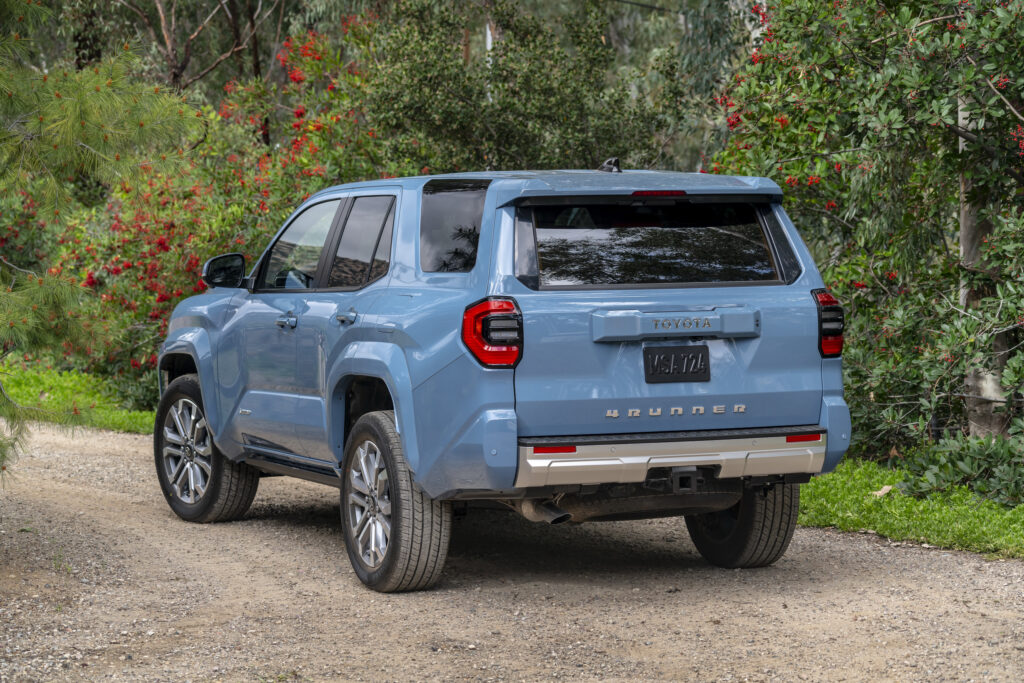
All this contributes to an approach angle of 32 degrees and a departure angle of 24 degrees, slightly less than the outgoing model’s 33-degree approach angle and 26-degree departure angle. Additionally, it offers 9.2 inches (233 mm) of ground clearance, although Toyota hasn’t confirmed if this applies to all 4Runner models. Expect the Trailhunter and TRD Pro variants to offer slightly more ground clearance due to their unique suspension setups.
As with other Toyota off-roaders, the new 4Runner will feature an upgraded Multi-Terrain Select system that now operates in both 4WD-High and 4WD-Low modes. This system offers adjustable settings for Mud, Dirt, and Sand terrains, optimizing traction control. Additionally, the quieter Crawl Control function serves as a low-speed off-road cruise control, while an electronically activated locking rear differential ensures balanced power distribution. Downhill Assist Control further aids in navigating descents by regulating vehicle speed.
Before delving into trims, let’s explore why Toyota opted to depart from the tried and true V6 engine.
Under The Hood
Axing the V6 won’t be a decision that every 4Runner fan loves, but the new base engine makes more power despite being smaller. Dubbed the i-Force, this 2.4-liter turbocharged engine makes 278 hp (207 kW) and 317 lb-ft (429 Nm) of torque. That’s the same one already doing duty in the new Tacoma where it has proven to be a solid performer. With the i-Force MAX version, we can expect even better performance.
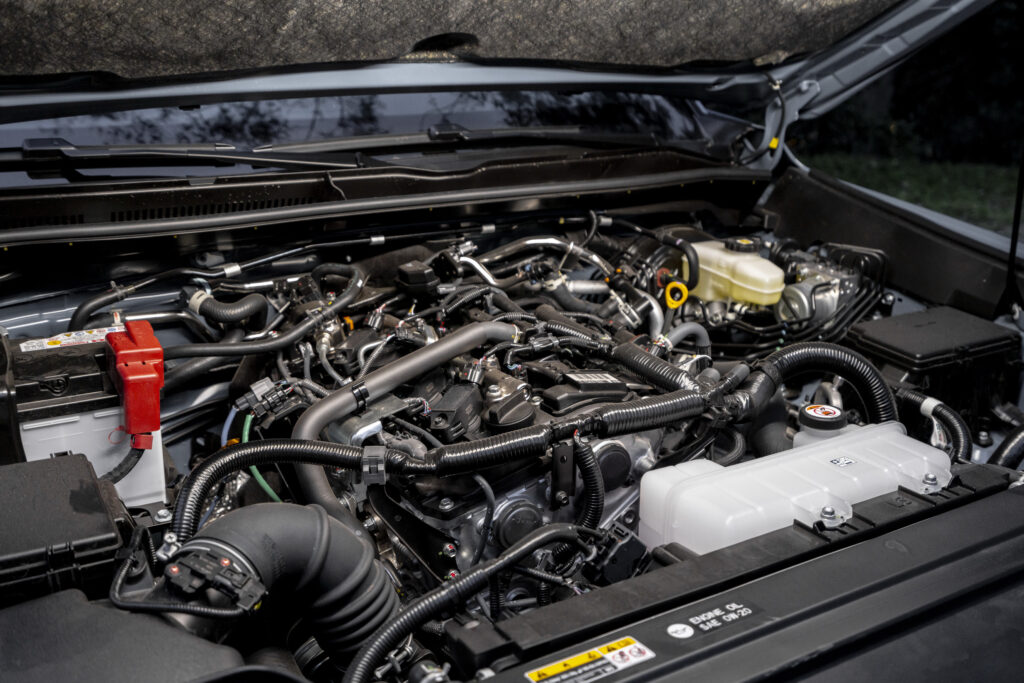
It generates 326 hp (243 kW) and 465 lb-ft (629 Nm) of torque, enabling the new 4Runner to tow up to 6,000 pounds. Both the base i-Force and the i-Force Max will utilize an eight-speed automatic gearbox. Sadly, the manual gearbox option available in the Tacoma is entirely absent in the 4Runner. As before, it will be offered with rear-wheel drive, part-time 4WD, or full-time 4WD.
RWD versions will feature an automatic limited-slip differential as standard. 4WD versions will come with a two-speed transfer case in addition to an automatic LSD. While Toyota has not yet released fuel economy targets for the new 4Runner, we expect they will be higher (at least on paper) compared to the 2024 model. The previous V6 engine, while classic, was known for its thirst, achieving at best 16 mpg in the city and 19 mpg on the highway.
A Trim For Everyone
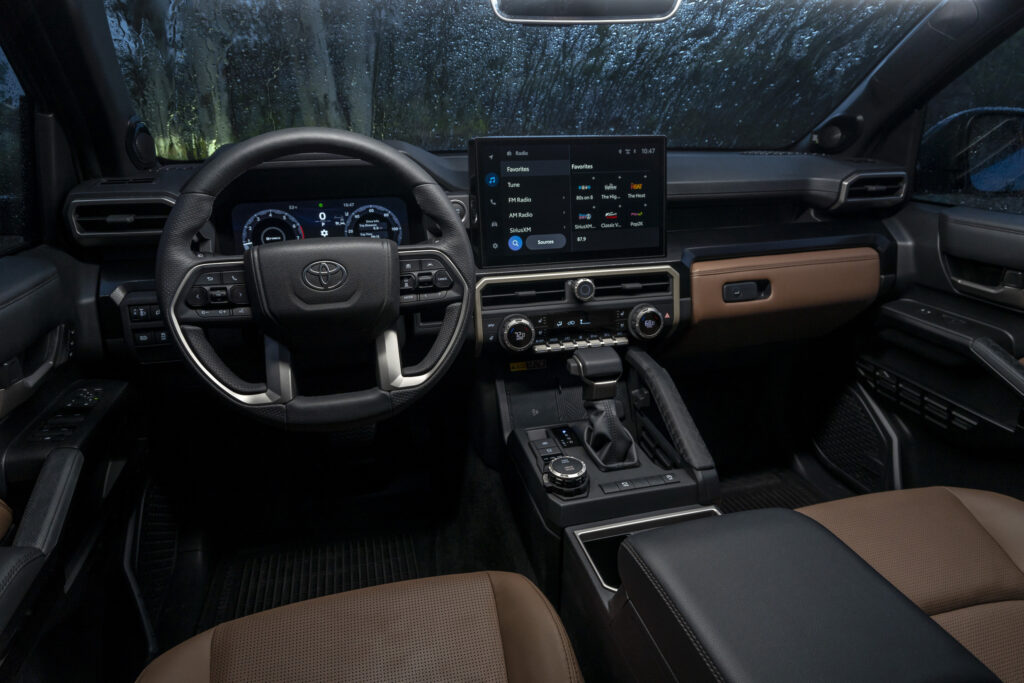
Toyota clearly wants to appeal to every possible customer with the 4Runner and as such it comes in nine different trims from luxurious to rugged. These include the SR5 (i-Force), TRD Sport (i-Force), TRD Sport Premium (i-Force), Limited (i-Force and i-Force MAX), TRD Pro (i-Force MAX), TRD Off-Road (i-Force and i-Force MAX), TRD Off-Road Premium (i-Force and i-Force MAX), Trailhunter (i-Force MAX) and Platinum (i-Force MAX).
It didn’t reveal every little detail about each trim, but the Tacoma might give us an idea of what to expect.
Things kick off with the SR5. That used to stand for Sport Rally Five-Speed but with the new 4Runner, we expect it’ll get 17-inch wheels, LED exterior lighting, and keyless entry. An 8-inch infotainment system and a 7-inch gauge cluster are confirmed as the base system.
More: We’re Driving Toyota’s Land Cruiser And Tacoma Hybrid, What Do You Want To Know?
Above that, the TRD Sport will likely add larger wheels, TRD-tuned suspension, and maybe a slight audio system upgrade. The TRD Sport Premium comes next and will likely add upgraded seating surfaces, maybe a sunroof, and some other luxuries. Each of these trims is limited to the standard i-Force engine only.
To get access to the i-Force MAX you’ll need to at least go for the Limited trim where it’s available as an option. Expect this trim to add even more luxury features and possibly the 14-inch infotainment system Toyota teased last week.
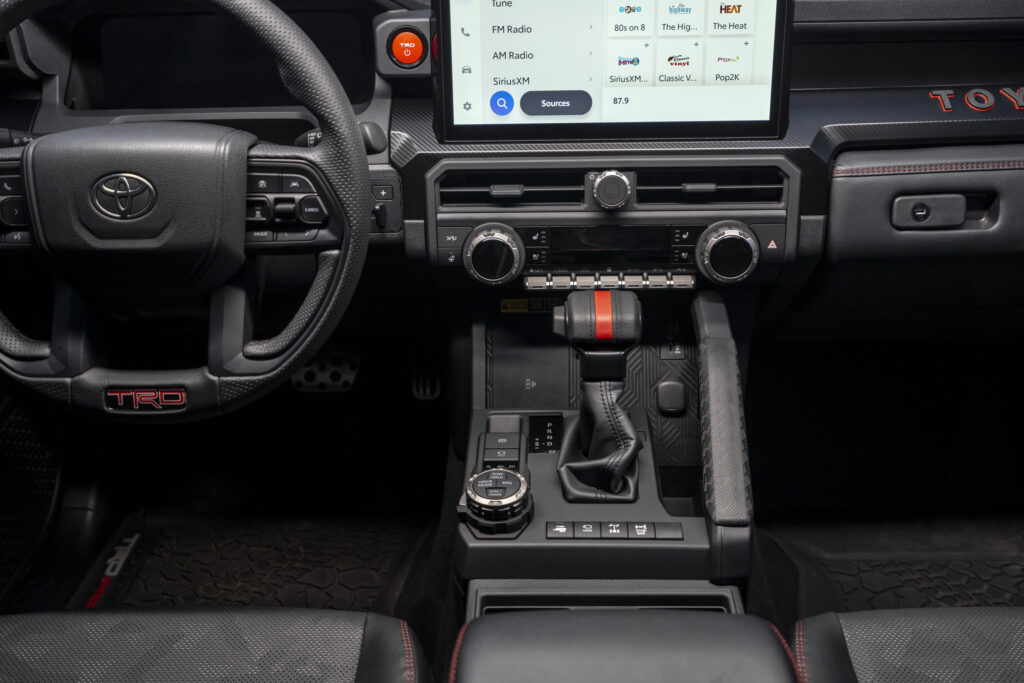
It could also include a 12.3-inch gauge cluster. The TRD Off-Road and TRD Off-Road Premium also get access to the more potent engine. We expect each to also come standard with 4WD. A locking rear differential is confirmed for the TRD Off-Road. What doesn’t appear to be coming to the 4Runner are the Iso-Sport seats from the Tacoma. Toyota says the won’t be on the menu at all.
Finally, three trims come standard with the i-Force MAX and two are brand new. They include the carryover TRD Pro trim and the new Trailhunter and Platinum trims. TRD Pro and Trailhunter also come standard with the locking rear diff. We have a separate deep dive into the all-new Trailhunter here.
Suffice it to say, it’s the new king of turnkey overlanding SUVs for interested buyers. The new Platinum will get just about every interior feature Toyota can throw at it, including the 14-inch infotainment system, a 360-degree camera system, and upgraded upholstery. We especially love the on-board air compressor, the rear power outlet, and the removable JBL speaker on the dash.
Important Details
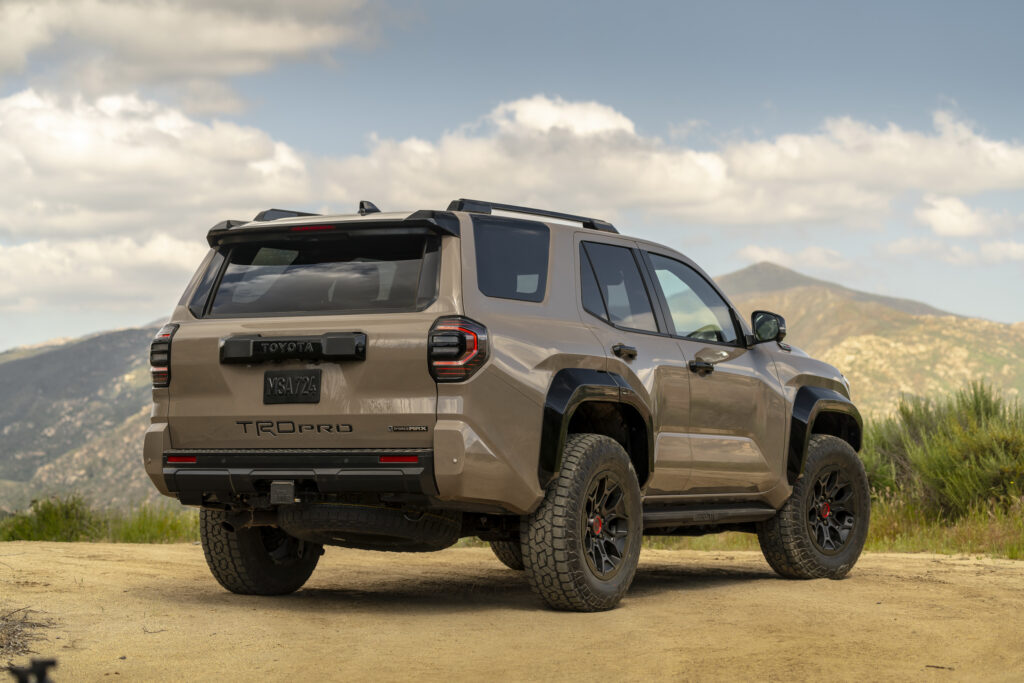
Rounding out the news on the 4Runner requires chatting a bit about safety too. Toyota’s Safety Sense 3.0 tech suite comes standard across the range.
It includes proactive driving assist, pre-collision detection, pedestrian detection, lane-departure warning, adaptive cruise control, lane-tracing assist, and emergency braking. That’s an outstanding package that rivals like Jeep and Ford would do well to emulate.
Toyota’s three-year or 36,000-mile limited warranty matches both Ford and Jeep. Notably, the i-Force MAX includes an eight-year or 100,000-mile warranty on hybrid-related components. All 4Runners benefit from two years or 25,000 miles worth of complimentary factory-scheduled maintenance. That’s better than what you’ll get with a Bronco but one year less than in a Wrangler.
Pricing And Availability
As of this writing, Toyota has not released information on pricing or fuel economy for the 4Runner, but it did confirm that it will go on sale this fall. If we were to make an educated guess about pricing, considering that the current 2024 model starts at $40,705 and rises to $55,170, and the new Land Cruiser starts from $55,950, we’d estimate the price range to be from the low $40,000s, up to around $60,000 for the higher end hybrid versions.
2025 Toyota 4Runner Limited
2025 Toyota 4Runner Trailhunter
2025 Toyota 4Runner TRD Pro


